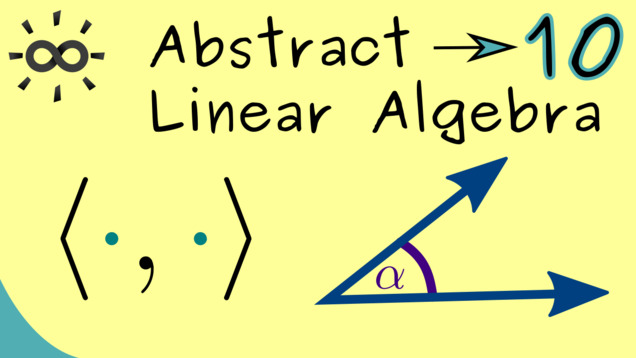
-
Title: Inner Products
-
Series: Abstract Linear Algebra
-
Chapter: General inner products
-
YouTube-Title: Abstract Linear Algebra 10 | Inner Products
-
Bright video: https://youtu.be/xYOxQaEDkdg
-
Dark video: https://youtu.be/FiahR01VK9E
-
Quiz: Test your knowledge
-
Dark-PDF: Download PDF version of the dark video
-
Print-PDF: Download printable PDF version
-
Thumbnail (bright): Download PNG
-
Thumbnail (dark): Download PNG
-
Subtitle on GitHub: ala10_sub_eng.srt missing
-
Timestamps (n/a)
-
Subtitle in English (n/a)
-
Quiz Content
Q1: Let $\langle \cdot, \cdot \rangle$ be an inner product on $\mathbb{C}^n$. What is not correct in general?
A1: $\langle x, y \rangle = 0$ implies $x = y$
A2: $\langle x, x \rangle = 0$ implies $x = 0$
A3: $\langle x, 0 \rangle = 0$ for all $x \in \mathbb{C}^n$
A4: $\langle x, i y\rangle = - \langle i x, y\rangle$ for all $x,y \in \mathbb{C}^n$
Q2: Let $\langle \cdot, \cdot \rangle$ be the standard inner product on $\mathbb{C}^n$. What is in general correct?
A1: $\langle x, y \rangle = x^\ast y$
A2: $\langle x, y \rangle = x^T y$
A3: $\langle x, y \rangle = 0$ for all $x,y \in \mathbb{C}^n$
A4: $\langle x, y\rangle = x -y$
Q3: Let $\langle \cdot, \cdot \rangle$ be the inner product on $\mathcal{P}([-1,1], \mathbb{R})$ given by $\langle f, g\rangle = \int_{-1}^1 f(x) g(x), dx$. Which polynomials are orthogonal to each other? Note that $f,g$ are called orthogonal if $\langle f, g\rangle =0$.
A1: $f(x) = x^2$ and $g(x) = x$
A2: $f(x) = x^2$ and $g(x) = 1$
A3: $f(x) = x$ and $g(x) = x$
A4: $f(x) = x^2$ and $g(x) = x^2$
-
Last update: 2024-11